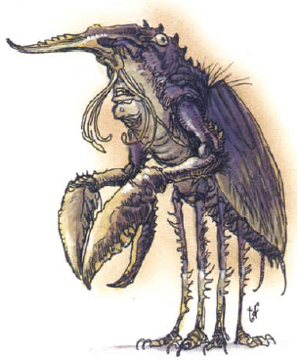

2132 � 2145

| Black | Violet | |
|---|---|---|
| Climate/Terrain: | Swamp, jungle | Swamps, caverns |
| Frequency: | Rare | Rare |
| Organization: | Pack | Solitary |
| Activity Cycle: | Night | Any |
| Diet: | Carnivore | Carnivore |
| Intelligence: | Animal (1) | Animal (1) |
| Treasure: | Nil | Nil |
| Alignment: | Neutral | Neutral |
| No. Appearing: | 1d4+1 | 1 |
| Armor Class: | 5 | 5 |
| Movement: | 6, Fl 12 (C) | 6, Fl 9 (D) |
| Hit Dice: | 2+2 | 3+3 |
| THAC0: | 19 | 17 |
| No. of Attacks: | 7 | 8 |
| Damage/Attack: | 1d4/1 (�6) | 1d6 (�2)/1 (�6) |
| Special Attacks: | Paralyzation, blood drain | Paralyzation, rending |
| Special Defenses: | Nil | Nil |
| Magic Resistance: | Nil | Nil |
| Size: | M (6� long) | L (9� long) |
| Morale: | Elite (15-16) | Steady (11-12) |
| XP Value: | 650 | 650 |
Garbugs are apparently related to carrion crawlers. They have six tentacles around their mouths and insectoid wings on their backs. In other respects they resemble lobsters, with eyestalks, antennae, an exoskeleton, and five pairs of limbs with pincers. The glossy black male has a long proboscis while the dominant female is of a striking hue of violet, except for the set of strong claws on her topmost pair of limbs, which are dark yellow.
Combat: Though garbugs readily eat carrion, they prefer living (but immobile) prey. Their six 2-foot-long tentacles each inflict 1 point of damage per hit and secrete a paralytic poison. Victims must make a successful saving throw vs. paralyzation for each such hit or be paralyzed for 2d6 rounds; simultaneous hits are not cumulative. The paralytic poison is also mildly corrosive, serving the garbug as a digestive aid. If not wiped or rinsed off, it will cause a mild burning sensation and 1 point of damage per turn over the next two hours.
A black garbug attacks with tentacles and proboscis. This feeding tube inflicts 1d4 points of damage. If the garbug paralyzes his victim during a round in which he hits with his proboscis, he leaves his proboscis inserted, draining blood for 1d4 damage per round. Black garbugs are very tenacious and often fight to the death, even if they only want a light snack.
The violet garbug attacks with tentacles and strong claws. Each claw inflicts 1d6 damage. If the violet garbug hits with both claws in the same round, she also rends the victim for an additional 1d4 points of damage. Once her victim is paralyzed or dead, she uses her claws to tear off hunks of flesh, which she transfers to her mouth, using her tentacles.
Except for the strong upper claws of the violet garbug, the monster�s pincers are too weak for combat. They are used simply to carry food or to hold the victim while feasting.
Habitat/Society: Black garbugs have no permanent lair, but violet garbles often claim a small cave or build a nest. Males and females come together to mate once or twice per year, and black garbles use their proboscises to fight one another in dazzling aerial combat, trying to win the privilege of mating with a violet garble. About a week after mating, the female lays 20-40 eggs in standing water, which hatch into nymphs that look like crayfish, but which are colored according to gender. There are usually five or six males for every female. In two months the nymphs undergo a metamorphosis and acquire adult characteristics.
Predators, including and especially adult garbles, keep the numbers of developing garbles small. Only 2d6 hatchlings per nest reach maturity and go off to claim their own hunting ranges. Garbugs seldom live longer than five years.
Ecology: Like carrion crawlers, garbugs perform a useful function. Besides eliminating refuse, they also prey on weak members of other species. Garbugs are also great enemies of spiders and favor them as prey. Garbugs, particularly violets, are very clever at luring spiders out of their lairs.
Incidental treasure, as well as the other remains of previous victims, may be found anywhere in the creatures� hunting grounds. They aren�t choosy about where they eat, and seldom take victims away from where they have been killed.
Garbug tentacles are useful in the manufacture of paralysis poisons, and they might be useful in the making of scrolls, glyphs, or other items that cause paralysis.
If a female garbug is captured while still a nymph, she may be raised as a guard animal. She can be trained to recognize a few individuals and to follow very simple commands. A violet garbug nymph brings as many as 1,000 gold pieces. Males, on the other hand, have defied all attempts at training.
Last Modified: April 21, 2009, 18:02:08 GMT

◆ 746 ◆